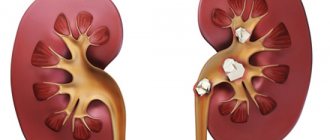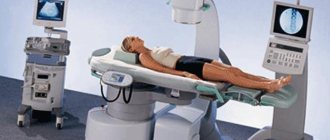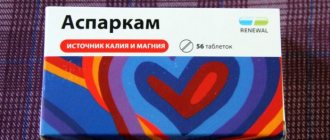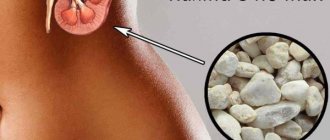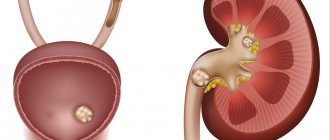Urolithiasis (synonym: urolithiasis) is a urological disease that is characterized by the deposition of stones in the urinary system. Stones can become lodged in one of the ureters, the bladder, or the urethra, causing renal colic, dysuria (difficulty urinating), or hematuria (blood in the urine). In the article we will analyze the treatment of urolithiasis in women - drugs and their mechanism of action.
In the International Classification of Diseases, 10th revision (ICD-10), urolithiasis is designated by code N20.
Features of the use of drugs for urolithiasis
Treatment depends on the type, volume and location of the stones. Small crystals - less than 5 mm - often leave the body on their own; if the size is 5 to 10 millimeters, therapy with alpha blockers is recommended. More complex treatment is usually not required. Urinary stones can sometimes be dissolved using medication.
Most large crystals that do not leave the body on their own must be removed by shock wave therapy or endoscopic surgery. The absolute indication for surgical intervention is a stone larger than 10 millimeters.
About 30-50 out of every 100 people who have had a kidney stone have a recurrence within five years. Since there are many causes of urolithiasis, it is important to know the chemical composition of the crystals.
To reduce the risk of crystal formation, you need to drink enough fluids and, if necessary, change your diet. Large randomized studies show that proper water consumption reduces the risk of urolithiasis by three times.
Many soft drinks - especially colas - contain phosphoric acid (food additive E338). E-substance may contribute to the formation of kidney stones. Therefore, abstaining from cola also reduces the risk of urolithiasis.
Both calcium and oxalate are found in many foods. However, the ratio of chemical compounds in food is more important than their concentration: research shows that a diet low in calcium favors stone formation because it increases the concentration of oxalate in the blood.
In patients with gout and diabetes, urate stones are most common. Uric acid is a breakdown product of so-called “purines”: they are formed in the body, but also partially enter it with food. Therefore, to prevent uric acid stones, it is recommended to use a diet with a reduced concentration of purines: reduce the amount of fish, meat and seafood consumed. There are no scientific studies yet that have examined the effect of a low-purine diet on the risk of urate stones.
Crystalline deposits less than 2 cm in diameter are treated with shock wave therapy. If the stones are larger than 2 centimeters, they are usually removed using an endoscope. Large stone formations in the lower part of the ureter are eliminated mainly through the urethra. The choice of treatment method depends on the patient’s condition and the anatomical location of the pathology.
Indications for drug therapy
Small stones often leave the body on their own and do not require surgery or medication unless they cause serious discomfort or complications.
Indications for use of drugs:
- the occurrence of stones in childhood or adolescence;
- family predisposition;
- certain diseases of the kidneys, urinary tract or gastrointestinal tract (risk groups);
- urinary tract infections;
- hyperuricemia;
- the presence of cystine stones (caused by a rare inherited metabolic disorder).
Review of drugs for the treatment of kidney stones
If discomfort occurs due to severe urolithiasis, both women and men can benefit from anti-inflammatory medications - Diclofenac, Paracetamol or Ibuprofen. Medications inhibit cyclooxygenase and prevent the formation of prostaglandins, mediators of inflammation and pain.
Alpha blockers are prescribed to help stones pass through the ureter. The drugs relax the muscles in the lower part of the bladder. They are also used to treat benign prostatic hyperplasia. Tamsulosin is not approved for the treatment of urolithiasis, but is often prescribed in conjunction with other medications.
According to current scientific evidence, alpha-blockers can significantly improve the passage of stones through the ureter. This was shown in an assessment of 55 studies:
- Without alpha blockers, about 50 out of 100 people were cured within four weeks.
- With the help of drugs, stones were eliminated in about 75 out of 100 people within 4 weeks.
Temporary adverse effects of medications include low blood pressure, dizziness, and fatigue. In a large study, 4 out of 100 people stopped treatment due to severe side effects. 5 out of every 100 men have experienced “dry ejaculation”: semen is expelled into the bladder rather than into the external space.
Groups of drugs and their general characteristics
For urolithiasis of the kidneys, alkaline drugs or sodium carbonate are used, sometimes Allopurinol. Soda ash increases the pH of urine, and Allopurinol reduces the level of uric acid. To increase the effectiveness of medications, you need to drink a lot of water to produce more urine and dissolve uric acid.
The main classes of drugs prescribed for urolithiasis:
- Nonsteroidal anti-inflammatory drugs (NSAIDs): Reduce pain and inflammation.
- Alkalinizing agents: Increase urine pH.
- Xanthine oxidase inhibitors: block the enzyme involved in the breakdown of purines into uric acid.
- Diuretics: accelerate urine excretion (diuretic effect).
- Antibiotics: fight against bacterial microorganisms.
- Alpha blockers: dilate smooth muscle and improve the passage of stones through the ureter.
Dependence of the choice of medication on the type of stones
Different types of stones have different compositions, which influence the choice of treatment tactics. Below is a list that presents drugs for the treatment of urolithiasis depending on the stones:
- Potassium citrate (trade name: Blemarene): It makes urine less acidic, thereby increasing its ability to dissolve salts. The drug is commercially available in the form of effervescent tablet, capsule and powder. It is used for the prevention of calcium, urate and cystine stones.
- Thiazide diuretics: medications reduce calcium concentrations and prevent the formation of oxalate stones.
- Allopurinol: This substance prevents the breakdown of purines into uric acid, thereby reducing the risk of urate crystals. The drug is mainly used for the prevention of urate.
- Other medications: Medicines that make the urine more acidic (L-methionine) are used to prevent stones caused by urinary tract infections. Magnesium binds oxalate and is said to inhibit the formation of calcium oxalate.
Description of individual representatives and application diagram
Tablets for urolithiasis are taken daily. Typically, they are only considered if there has been a relapse or the patient's condition has deteriorated significantly. In large-scale studies, medications to prevent urolithiasis have been shown to help prolong remission.
Potassium citrate has been shown to be effective in several studies:
- Without potassium citrate, 53 out of 100 people relapsed within two years.
- With the drug, 13 out of 100 people developed one kidney stone over a two-year period.
Possible side effects of potassium citrate include gastrointestinal discomfort and diarrhea. In studies, about 13 out of 100 people stopped treatment due to adverse effects.
Thiazide diuretics have also been used in studies to reduce the risk of kidney stones. They may have various side effects. These include low blood pressure with dizziness and fatigue, dry mouth and erectile dysfunction.
Allopurinol is primarily used for the prevention of urate stones. However, until now its effectiveness has only been studied in studies of people with calcium stones. They showed that the drug can protect against oxalate and phosphate crystals. The substance can cause a rash and sometimes an attack of gout. However, in the trials, the majority of patients did not discontinue allopurinol treatment due to side effects.
Antibiotics for infectious urolithiasis can only be taken under the supervision of a doctor. It is recommended to use ampicillin or other broad-spectrum antimicrobial agents.
Pain and other symptoms during the acute period should be treated with analgesics. Homeopathic painkillers have a placebo effect and are therefore not recommended as symptomatic or etiotropic treatment.
Treatment of stones in men and therapy in women: is there a difference?
The causes and symptoms of the development of stones in the structures of the urinary tract may differ in individuals of different sexes. But there is no clinically significant difference between the treatment of urolithiasis in men and women. Sex differences in the treatment of urolithiasis have not been identified in any large randomized trial.
Causes of inflammation
Most often, the disease develops due to the body’s predisposition to metabolic disorders, which results in the accumulation of insoluble salts from which stones are formed. Deposits differ in their chemical properties into oxalate, phosphate, cystine and uric acid. There are deposits of a mixed type, when the shell is formed from one type of salts, and the core is represented by another type. In addition, the disease can be caused by other reasons:
- Infections and inflammations in the genitourinary system, kidney disease.
- Insufficient content of vitamins A and B.
- Poor nutrition and sedentary lifestyle.
- Diseases of the gastrointestinal tract.
- Harmful working conditions.
- Bone diseases.
- Heredity.
Abuse of alcoholic beverages and working at high temperatures can also cause the development of illnesses. The formation of stones is also promoted by urogenital infection, which is sexually transmitted.
Therapy prognosis
Timely conservative or surgical therapy helps 95% of patients go into remission. Over the next 5 years, 60% develop a relapse (recurrence of the disease). Patients are advised to stay hydrated and exercise regularly. It is strictly forbidden to self-medicate at home with untested herbs or alternative methods. Many drugs have unproven clinical effectiveness and may cause more harm than potential benefit.
Various kidney diseases cause discomfort to a man and disrupt the usual rhythm of life. It is better to start therapy for diseases immediately, when the first symptoms of the disease appear (urinary disorders, fever, nagging pain in the lower back). For a quick recovery and to avoid relapses and complications, it is recommended to carry out complex therapy, which includes medications for the kidneys of various groups.
The most common symptoms of kidney disease:
- Low-grade fever for a long time. However, by the end of the day it usually increases.
- Periodic increase in pressure.
- Discomfort in the lumbar region.
- Cutting and stitching pain that radiates to the groin.
- The urine becomes dark.
- Cloudy urine, presence of flakes in it.
- Bags under the eyes, swelling of the arms and legs.
- Dramatic weight loss or dietary changes.
- Frequent urge to urinate.
- Pain in the ureter or kidneys during urination.
- Increase or decrease in urine output.
- Constant thirst.
If any of the symptoms occur, you should consult a specialist as soon as possible.
During the initial examination, the nephrologist will conduct palpation, percussion of the kidney area and a survey. To confirm the diagnosis, a urine test is prescribed. Increased white blood cells, the presence of protein and red blood cells indicate an inflammatory process. A general blood test in this case will also show an increase in the number of leukocytes and ESR.
Additional diagnostic methods are prescribed:
For the drug treatment of various kidney diseases, the following groups of drugs are used:
- painkillers;
- diuretics;
- antiseptic and antibacterial;
- antispasmodic;
- preparations for dissolving stones;
- vitamin and mineral complexes.
Kidney pills are prescribed by a doctor in combination to achieve a faster therapeutic effect.
When kidney function is impaired, urine and salts are not excreted, but accumulate in the blood. They penetrate the tissues and injure them, which makes the situation worse.
List of diuretics:
| Group name | Drugs | Description |
| Thiazides | Hypothiazide, Hydrochlorothiazide | They have a quick effect - a positive effect is achieved within 1-2 hours after administration and lasts 12 hours. Thanks to these drugs, the loss of nutrients that are excreted in the urine is minimized. But it is not recommended to take them on your own, since diuretics, as indicated in the instructions for use, have a number of contraindications and side effects |
| Looped | Ethacrynic acid, Furosemide, Bufenox | The effect is achieved quickly: within 15-20 minutes after administration, the patient wants to empty the bladder. Loop-shaped drugs should not be taken independently. Only a doctor prescribes them if it is necessary to urgently remove fluid from the body (before surgery or severe intoxication) and accurately calculate the dosage |
| Potassium-sparing | Aldactone, Veroshpiron, Spironolactone | Prescribed for minor kidney problems. These drugs have a cumulative effect - the diuretic effect is observed only at the end of the 2nd day of use. Potassium-sparing drugs are aimed at maintaining the required level of potassium and magnesium in the body by creating artificial obstacles to their removal |
| Osmotic drugs | Mannitol | Used for exacerbation of a chronic disease. When the condition normalizes, gentler drugs are prescribed |
The main purpose of taking this group of drugs for kidney treatment is to relieve pain.
| Group name | Drugs | Description |
| Antipyretics | Analgin, acetylsalicylic acid, paracetamol | These are inexpensive and safe drugs that are sold in pharmacies without a doctor's prescription. They not only have an analgesic effect, but also reduce body temperature. The dosage and regimen, however, are prescribed only by a doctor. |
| NSAIDs | Diclofenac, Indomethacin, Ibuprofen | They have an analgesic and anti-inflammatory effect. The drugs are available in the form of tablets, syrups, and solution for injection. Morphine and Promedol contain narcotic substances and are therefore considered less safe. They are used for severe pain and colic when NSAIDs do not help. |
Prescribed for an infectious process in the kidneys. Such drugs destroy bacteria that cause inflammation. Antiseptic drugs (Furangin, Nitroxoline) are of semi-synthetic origin. The positive effect occurs only at the end of 2 weeks of taking the drugs.
This process can be accelerated when taken together with antibacterial agents:
- fluoroquinolones (Ciprofloxacin, Maxifloxacin);
- sulfonamide group (Sulfadimezin, Lidaprim);
- nitrofurans (Furadonin, Furamag);
- aminopenicillins (Amoxicillin, Ampicillin).
Before prescribing them, it is advisable to conduct a study to determine the type of bacteria and their sensitivity to antibiotics. The course of treatment is 7-14 days.
When it is difficult to excrete urine from the body, severe pain occurs, which is accompanied by spasms. In this case, it is recommended to use No-Shpu or Papaverine. They act on smooth muscles, which reduces spasm.
For severe colic or constant attacks, these drugs will not have the desired effect. To relieve severe attacks, Spazmolgon or Spasmonet are prescribed.
Antispasmodics are prescribed as an addition to the main therapy. Under their influence, the lumen of the urinary canals increases, which facilitates the passage of urine and prevents its stagnation.
Some kidney diseases are associated with the formation of stones. To crush and remove them, synthetic drugs that dissolve stones are prescribed:
- Panangin;
- Blémarin;
- Allopurinol.
Such drugs are used for 3-6 weeks.
Herbal preparations have a good therapeutic effect. They contain herbs that have diuretic, bactericidal and antiseptic effects. Herbal preparations are not able to act quickly and are therefore prescribed as an adjuvant. Before using them, you should consult your doctor, since the presence of stones may cause them to move.
| Name | Description |
| Canephron | Includes herbs lovage, rosemary, centaury. Used in the treatment of kidney diseases of an infectious or non-infectious nature. Can be used to prevent stone formation. Not compatible with alcohol |
| Cyston | Contains a large number of herbs that alleviate the condition of urolithiasis and infectious process. Removes elements from urine that contribute to the formation of stones |
| Monurel | The dietary supplement contains cranberry extract and ascorbic acid. The product has a bactericidal and antiseptic effect. Prescribed for complex treatment to restore bladder function |
| Phytolysin | The product is made in the form of a paste and includes plant extracts and essential oils that have anti-inflammatory and diuretic effects. Prescribed for inflammation and urolithiasis |
| Urolesan | Herbal drops and capsules eliminate spasms and pain in the lumbar region, restore the process of urination, relieve inflammation |
Conducted studies have proven that timely treatment with herbal preparations at the initial stage of kidney disease is effective.
Herbs are an effective addition to the basic treatment of kidney disease.
| Components | Effect | Mode of application |
| Corn silk | They have a positive effect on the condition of the kidneys in various diseases, and also relieve swelling. During treatment, it is advisable to avoid salt intake |
|
| Bearberry | Helps with serious kidney inflammation. Has an antiseptic and anti-inflammatory effect |
|
| Flax seeds, strawberry and birch leaves, nettle | The collection is effective for pyelonephritis |
|
Therapy will be effective if the drug is taken continuously
Every month you should take a break of 1 week
To maintain kidney function and filter out toxic substances, it is necessary to maintain normal levels of vitamins and minerals. This:
- vitamins A, E, B1-B12, omega 3, ascorbic acid;
- trace elements - calcium, magnesium, potassium and sodium.
They can be obtained from the diet or from pharmacy vitamin-mineral complexes:
- Gentos forte;
- Urinal;
- Nephrosil;
- Nephrin complex Colloid.
Some groups of drugs can be used in the form of suppositories:
- painkillers and anti-inflammatory drugs (Diclofenac, Voltaren, Nurofen);
- antispasmodics (Papaverine, Spasmolitin).
The action of suppositories occurs faster and the active substances do not affect the liver.
For various kidney diseases, painkillers and diuretics are almost always prescribed. But some pathologies require the use of other means.
With this syndrome, stones form in the kidneys. To diagnose them, you need to undergo an ultrasound. Doctors prescribe citrate mixtures, which help dissolve stones and gradually remove them, as well as antispasmodics and painkillers. In severe cases, surgical intervention is prescribed.
Colic is a consequence of a disease (most often it is urolithiasis). Colic manifests itself as a sharp pain, due to which the patient cannot even move. When the first signs appear, you should drink No-Shpa, Papaverine or Baralgin.
If an inflammatory process occurs in various parts of the urinary system (pyelonephritis, glomerulonephritis, cystitis), antibacterial drugs are prescribed together with herbal preparations. With the right antibiotic, relief occurs on the 2nd day of treatment. Taking antibacterial agents requires plenty of fluid intake so that the active substances can act and remove pathogenic microorganisms in the urine. If necessary, painkillers are prescribed.
A characteristic sign of the disease is a decrease in the rate of formation and excretion of urine. If left untreated, large amounts of toxins accumulate in the kidneys. In this case, the treatment will be complex and includes diuretics and enterosorbents.
The tumor can be either benign or malignant. In the second case, the condition can be significantly improved only by surgical intervention. The positive effect of treatment depends on the type of tumor, duration of the disease and the extent of damage.
This condition is characterized by the accumulation of urine in the kidney. If left untreated, the organ expands and dies. The main method of treatment is surgery, which restores the normal flow of urine. For an uncomplicated process, antibiotics, painkillers and antispasmodics are prescribed.
This is a large number of benign neoplasms in the organ. The main goal of therapy is to delay the development of kidney failure. For this, Canephron, Phytolysin or Cyston are prescribed.
The Chinese consider the kidneys to be one of the main organs of the human body. There is a theory that at birth, each organ is given a certain supply of energy. It is important to keep it unchanged for as long as possible. To do this, it is recommended to perform a set of exercises daily:
- Stand straight, feet shoulder-width apart, back straight. Inhale and raise your arms to shoulder level (palms facing down). Exhale and tilt your body to the right, with your hands at shoulder level. Try to get as low as possible and look at your left hand. Inhale and return to the starting position. Perform by tilting the other side.
- Stand up straight, tense the muscles of your legs and buttocks. Inhale, holding your breath, count to 10. Hands should be on your back at the level of your kidneys. Apply pressure on each of them in turn. At the same time, bend your back back.
- Starting position as in the second exercise. Replace pressure with light pats. It is advisable to wet your hands in cold water to increase blood circulation.
Urolithiasis is a pathological condition of the body in which, due to metabolic disorders, the formation of stones (calculi) occurs and their deposition in different parts of the urinary system.
This process can remain invisible to humans for a long time. The disease usually manifests itself during the movement of stones or during infection and inflammation caused by these stones. Urolithiasis (UCD) is accompanied by severe pain, renal colic, impaired urine output, intoxication of the body and can result in renal failure.
Mechanism of stone formation
Urolithiasis is a disease in which multilayer crystalline formations form in the cavity of the renal pelvis or bladder.
Since urine is a multi-component solution, saturated with salts, minerals and protein components, an imbalance in the chemical balance between the elements leads to the formation of crystalline stones.
One of the leading factors influencing the primary formation of stones is an increase in the protein component and mucopolysaccharides, which contribute to the “gluing” of salt crystals into multilayer formations.
If the amount of protein substances is the basis for the formation of stones in the urinary tract, then the activity of the crystallization process depends on the acid-base balance of urine.
The acid-base reaction of urine determines the degree of “gluing” ability of proteins and mucopolysaccharides, as well as the transformation of the form of uric salts from soluble to crystallized.
The normal acid-base reaction of urine is within the pH range of 6-7
Review of drugs used in the treatment of urolithiasis
For each person with urolithiasis, before prescribing tablets and other methods of treatment, the composition of the stones and their location are determined. Various metabolic disorders cause the formation of stones of a special type, which are treated with different methods and drugs.
Attention: independent treatment of urolithiasis is impossible. Drugs for urolithiasis of the kidneys can only be selected by a doctor after a comprehensive diagnosis.
Groups of funds used:
- Preparations for dissolving stones and removing them. Urate (uric acid salts) and oxolate (oxalate) stones can be dissolved and excreted in the urine. To break down stones and wash them out, Allopurinol, Blemaren, Uralit-U, Enatin are used.
- Drugs that normalize the composition of urine and prevent stone formation - Hydrochlorothiazide, Canephron, Cyston.
- Drugs that improve metabolic processes and microcirculation - Trental, Pentilin, drugs that prevent blood clots - Aspirin.
- Multivitamin complexes to activate the body's defenses.
If the size of the stones exceeds 5 mm, and they cannot be dissolved with drugs, methods of crushing and subsequent removal are used.
The same set of drugs is used to treat urolithiasis in men. Prostatitis often contributes to the appearance of stones in men. Therefore, the necessary set of remedies includes medications against this disease.
How are stones formed?
The kidneys are a paired organ that filters fluid in the body, removing toxins, poisons and processed food products from it. They, like all other organs, are susceptible to various diseases. Urolithiasis is one of them.
When the body does not absorb certain microelements or there are so many of them in the diet that the body is not able to completely remove them, they begin to be deposited in the kidneys and ureters - first in the form of sand, and then as larger formations. They can be discovered accidentally during an ultrasound or x-ray.
Types of kidney stones:
- Urates (sodium salt of uric acid). They are formed if the urine density is high and its reaction is acidic. Such stones can be dissolved.
- Oxalates and phosphates (salts of oxalic or phosphoric acid). They are formed if the urine has an alkaline reaction and is very difficult to dissolve.
Effective antibiotics for urolithiasis
Taking antibiotics helps to avoid infection, which often accompanies urolithiasis, or to cure inflammation that has begun. Their choice is made after bacterial culture of urine and determination of sensitivity to the drug.
- Cephalosporins. These drugs have the ability to concentrate in the kidneys and urine. Usually prescribed when there is a threat of purulent inflammation. They have low toxicity. Cefotaxime, Zinnat, Cefazolin, Cefradin, Tamycin.
- Aminoglycosides. Highly effective antimicrobial agents do not cause allergic reactions. However, they are toxic. Gentamicin, Amikacin.
- Carbapenems. One of the new groups of antibiotics, which therefore often turns out to be the most effective. Imipenem is often combined with cilastatin.
- Macrolides. Azithromycin, Vilprafen - these drugs are used in the treatment of urolithiasis in women. They are effective in case of infection of the genital organs, which often accompanies ICD. In women, urolithiasis is often diagnosed during the treatment of vaginitis and adnexitis.
- Fluoroquinolones. They are effective against many pathogens, have a strong effect and are prescribed for severe inflammation. Can be used in combination with other antibiotics. Ofloxacin, Pefloxacin. Not prescribed during pregnancy.
- Penicillins. Ampicillin and Solutab are used. These drugs are non-toxic and are often prescribed to pregnant women and children. However, they may cause allergic reactions.
Important: antibiotics for urolithiasis are prescribed for a course of treatment until the source of infection is completely destroyed. If you refuse to take it, you may develop a purulent focus of inflammation and impaired kidney function.
How to make a diagnosis
Diagnosis of the disease is carried out by a urologist after conducting the following studies:
- Ultrasound examination of the kidneys and bladder.
- Urography.
- X-rays of the genitourinary system.
The patient also needs to undergo general blood and urine tests to identify the inflammatory process.
Which antispasmodics help best?
These drugs are used in the treatment of urolithiasis to relieve pain and reduce swelling of tissues damaged by standing stones. They are often prescribed together with non-steroidal anti-inflammatory drugs (NSAIDs) - Diclofenac, Ketoprofen.
- Neurotropic antispasmodics – M-anticholinergics – Atropine, Metacin.
- Myotropic - No-shpa, Drotaverine, Mebeverine, calcium channel blockers - Tamsulosin.
- Propantheline Bromide, Papaverine, Diprofen - relieve spasm of smooth muscles.
- Avisan is an antispasmodic of plant origin, relaxes smooth muscles, promoting the passage of stones and the outflow of urine.
When treating urolithiasis in women during pregnancy, antispasmodic drugs and analgesics are mainly used. When taking antispasmodics, by relieving muscle tension, pain is reduced and urodynamics are improved.
What analgesics are best to use for pain?
Urolithiasis is accompanied by aching pain in the lumbar region and attacks of renal colic when stones move, especially during passage through the ureter. Pain is relieved not only with antispasmodics, but also with non-narcotic and narcotic analgesics.
A non-narcotic drug is often Baralgin, which is used intramuscularly and intravenously. It relieves moderate pain well. Voltaren and Trigan are used.
Pain during renal colic can only be relieved with narcotic drugs. Promedol is most often used.
Symptoms
Signs indicating the presence of the disease:
- Nagging pain in the lumbar region. They get worse after a long drive, sports or hard work. Depending on the location of the stone, pain may radiate to the genitals, thighs, or lower abdomen.
- Frequent urination. They occur when stones are located in the area of the ureters. The urine becomes discolored.
- Renal colic. It appears when a stone blocks the ureter, preventing urine from flowing out. It is accompanied by severe pain, nausea and vomiting. After the stone passes, blood appears in the urine.
Homeopathy - is it justified?
Homeopathic methods are often used in the treatment of urolithiasis. They are used with a mandatory diet and fluid intake of 1.5-2 liters.
Taking these medications without consulting a homeopathic specialist is not recommended. After determining the type of stones, you can use the remedies indicated for this pathology. Homeopathic remedies – Solidago, Hamamelis.
Doctors believe that taking these homeopathic drugs reduces the body's immune strength and its ability to produce antibodies. Therefore, it is better to consult a nephrologist before taking these medications.
Physiotherapy
In the treatment of urolithiasis, hardware methods of physiotherapy are used, as well as massage and physical therapy. Along with medications, these methods for urolithiasis help improve metabolism and blood supply to the pelvic organs.
- Special complexes of physical therapy.
- Massage of the back, chest, peritoneum, limbs.
- Reflexo- and magnetic therapy.
- Mud therapy.
At home, for urolithiasis, you can use the Almag-01 device. The use of the device is not recommended for stone sizes larger than 5 mm. When using the device, intracellular metabolism significantly improves.
Why do kidney stones appear?
There are many reasons for the formation of stones. In order to determine why they appeared in an individual patient, long-term laboratory studies will be needed. The main reason for the development of the disease is metabolic disorder. Stones can also appear as a result of inflammation developing in the organs of the genitourinary system.
Important: Factors that contribute to the occurrence of urolithiasis include poor diet, water composition, diseases of the joints or organs of the digestive system.
What diuretics are best to take for urolithiasis?
The main task of the kidneys is to remove waste metabolic products with excess fluid. In cases of impaired renal function, edema indicates retention of water and waste products in the body.
Part of the therapy for urolithiasis is the normalization of diuresis - the removal of urine from the body. For this purpose, synthetic diuretics and folk remedies are used.
- Saluretics – Furosemide, Indapamide. They have a pronounced diuretic effect, remove sodium and potassium ions. Improves heart function and has a hypotensive effect. They fight edema well.
- Potassium-retaining agents – Amiloride. They remove sodium salts, retaining potassium and magnesium. Long-term use is indicated. Gently reduce blood pressure.
- Osmotic – Mannitol, transfers excess fluid from cells into the blood, increasing its movement and blood supply to the kidneys. Used to accelerate the removal of excess fluid.
Herbal preparations – Canephron, Cyston, Enatin – have a good diuretic effect for urolithiasis.
To remove excess fluid and remove stones, the beneficial properties of mineral waters are used - Essentuki, Narzan, Borjomi. Water is selected according to indications, taking into account the types of stones. Uncontrolled consumption of mineral waters is prohibited.
When choosing folk remedies, it is necessary to take into account the size of the stones and their composition. Therefore, you should consult a specialist before use.
Where does it come from?
The reasons that provoke the development of urolithiasis are banal to the point of disgrace:
- heredity;
- sedentary lifestyle;
- poor drinking regime or simply dehydration;
- diseases of the urinary tract and digestive tract;
- increased love for meat and products containing purine bases - mushrooms, legumes, spinach, sorrel, grapes and its derivatives (wine, raisins).
All this slowly but steadily leads to metabolic failure and disruption of the alkaline environment in the body. And thanks to them, in various organs of the urinary system - kidneys, ureter, bladder - various mineral compounds begin to precipitate and compact into pebbles.
The cause of urolithiasis can be a lack of certain substances, for example, vitamin D. If you are not careful about making your diet balanced, feel free to nominate yourself as a nominee for the unattractive “Uurolithiasis” award.
Prevention
After you manage to get rid of the stones, you must not forget about following a diet, reasonable physical activity and giving up bad habits. This will help prevent metabolic disturbances in the future. It is necessary to monitor the composition of urine by regularly taking tests, and do an ultrasound so as not to miss new formation of stones.
If there are errors in the diet, stones will form again. Therefore, you need to adjust your lifestyle and always follow it. Pills alone will not cure urolithiasis.
| Motherwort, rosehip root and fruits, tricolor violet, horsetail, St. John's wort | This collection is effective for inflammation of the urinary system |
|
Diagnosis of the disease
To diagnose the presence of urolithiasis, a number of measures are necessary:
- conducting ultrasound examinations of the kidneys for new formations;
- use of spiral tomography;
- checking urine for acid content, general blood tests, urine tests;
- checking urine for interactions with antibiotics;
- clarification of hereditary factors;
- carrying out a urine test for calcium, ammonium chloride, sometimes a biochemical test is prescribed.




